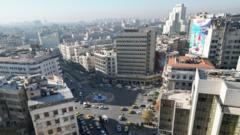In a landmark move, US diplomats have arrived in Damascus, Syria, to meet with representatives from Hayat Tahrir al-Sham (HTS), the group that has emerged as a significant power broker following the recent collapse of President Bashar al-Assad's regime. This visit marks the first official diplomatic engagement by the US in Syria in over a decade, indicating shifting political dynamics in the region following the fall of a long-standing government.
The American delegation, featuring prominent officials such as Assistant Secretary of State Barbara Leaf and Roger Carstens, the US hostage envoy, seeks to engage not only with HTS but also with broader segments of Syrian civil society. According to a State Department spokesperson, the aim is to hear directly from diverse Syrian voices about their aspirations for the future, and to discuss how the US might support these endeavors.
Despite HTS being recognized by Washington as a terrorist organization, the US is tentatively opening channels of communication, signaling a possible shift towards a more pragmatic engagement strategy. The discussions are expected to focus on pushing HTS towards establishing a more inclusive and non-sectarian governance framework.
This initiative follows similar diplomatic overtures from the United Nations and European nations, including the UK, France, and Germany, who have also initiated dialogues regarding Syria's future governance and stability. The US officials are not only tasked with addressing governance issues but also working to gather intelligence regarding Austin Tice, an American journalist who was abducted in Damascus in 2012.
Amidst this precarious diplomatic engagement, the US appears to be laying down conditions for any potential consideration of de-listing HTS as a terrorist organization—a move that could substantially impact sanctions relief efforts critical to a struggling Damascus. Overall, this development reflects the complexities and evolving realities on the ground in Syria, as major international players navigate their approaches to constructively influence the country's future.
The American delegation, featuring prominent officials such as Assistant Secretary of State Barbara Leaf and Roger Carstens, the US hostage envoy, seeks to engage not only with HTS but also with broader segments of Syrian civil society. According to a State Department spokesperson, the aim is to hear directly from diverse Syrian voices about their aspirations for the future, and to discuss how the US might support these endeavors.
Despite HTS being recognized by Washington as a terrorist organization, the US is tentatively opening channels of communication, signaling a possible shift towards a more pragmatic engagement strategy. The discussions are expected to focus on pushing HTS towards establishing a more inclusive and non-sectarian governance framework.
This initiative follows similar diplomatic overtures from the United Nations and European nations, including the UK, France, and Germany, who have also initiated dialogues regarding Syria's future governance and stability. The US officials are not only tasked with addressing governance issues but also working to gather intelligence regarding Austin Tice, an American journalist who was abducted in Damascus in 2012.
Amidst this precarious diplomatic engagement, the US appears to be laying down conditions for any potential consideration of de-listing HTS as a terrorist organization—a move that could substantially impact sanctions relief efforts critical to a struggling Damascus. Overall, this development reflects the complexities and evolving realities on the ground in Syria, as major international players navigate their approaches to constructively influence the country's future.



















